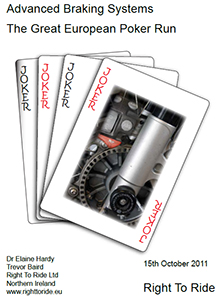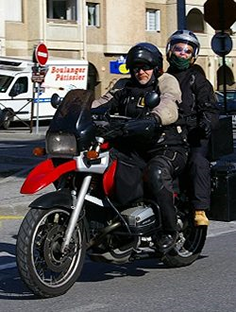 The European Commission’s proposal for the Approval and Market Surveillance of two or three-wheel vehicles and quadricycles is moving through the European processes.
The European Commission’s proposal for the Approval and Market Surveillance of two or three-wheel vehicles and quadricycles is moving through the European processes.
The next stage sees a vote in the IMCO (Internal Market and Consumer Protection) committee scheduled for November 22nd, before going to the European Parliament.
Although the proposals were aimed at simplifying legislation, the Commission included so-called safety technology such as the mandatory application of Advanced Braking Systems (ABS).
The argument that the Commission, the Rapporteur of the IMCO committee Wim van de Camp and the Department for Transport in the UK have used, is that ABS will reduce around 20% of fatalities over the next ten years.
Until now, we have stayed away from the “safety” debate regarding ABS, because there is a general consensus that overall, they do help in certain conditions to stop the motorcycle and help to stop loss of control.
To balance the debate, we have asked the views of two highly respected motorcycle trainers: David Hough – U.S. Motorcycle Trainer, writer and journalist and David McGuckin – Northern Ireland Motorcycle Training Instructor.
Both give us their insight into ABS from their knowledge and experience and both have come to very similar conclusions.
David Hough, “Rather than attempt to make up for rider lack of braking skill by incorporating “safety” devices into the machine, I suggest training riders to manage the situation, including skilled throttle-to-brake transitions, and independent front-rear braking”.
David McGuckin, “My firm opinion is that mandatory ABS is going to do very little for accident reduction unless very expensive training is also mandatory. It’s strange that we can force everybody to pay more for expensive technology but not to be able to train people to use what we already have properly!”
Our experts have indicated that training is a far better option than mandating ABS technology.
However European Commission has stated that it will maintain its position NOT to include items such as training in the proposal that are irrelevant to technically approve a motorcycle.
In its opinion on the Commission’s proposals, the European Economic and Social Committee (EESC) agrees with the proposals in reference to ABS, but it also reiterates the need to properly evaluate the cost-effectiveness of the different systems, depending on the different products and their usage patterns.
In this respect, the EESC supports a technology-neutral approach in the area of advanced braking systems, in order to provide manufacturers with the necessary flexibility and stimulate innovation, in the interest of the consumer. This is what we have consistently argued.
However we also believe that the inclusion of ABS in the proposals is not just an issue of cost, but a means by which the Commission and Parliament can state that they have done their part to reduce motorcycle casualties.
In our opinion, statements that ABS will reduce casualties by 20% over the next 10 years is reckless because it may lead motorcyclists and safety organizations to believe that ABS will reduce casualties in ALL braking situations, rather than stop the motorcycle safely in specific scenarios.
Along with David Hough and David McGuckin, our opinion is that ABS is not THE panacea to reduce motorcycle casualties that our friends in Brussels would have us believe.
For the Great European Poker Run – pdf 853kb – Click Here
Leave comments at Right To Ride EU – Click Here


